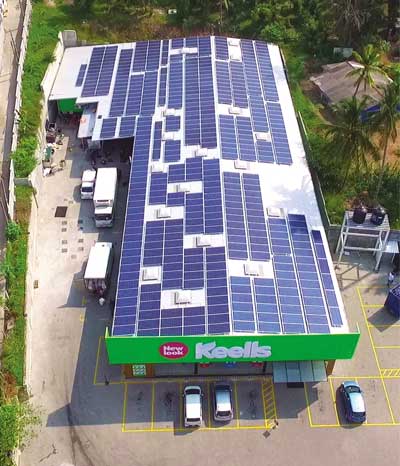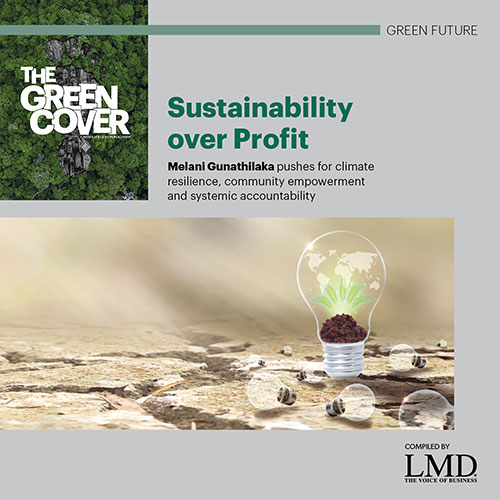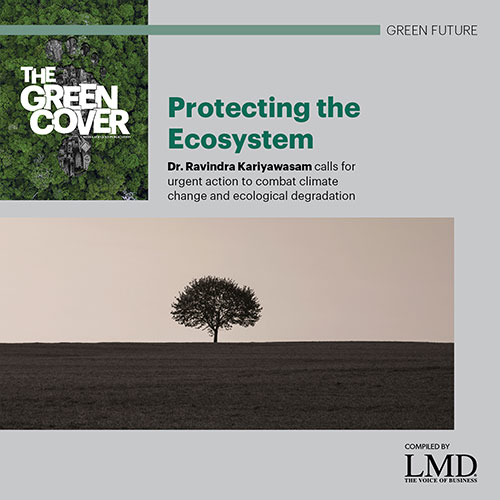JOHN KEELLS HOLDINGS

Q: What does ‘corporate sustainability’ mean for your organisation?
A: At John Keells, sustainability is about being responsible and sustainable in our operations whilst safeguarding the wellbeing of our people, the community we operate in and the planet.
Sustainable practices are a strategic priority for the group and remain embedded in our decision making. We recognise that social responsibility, environmental stewardship and financial objectives are mutually inseparable.

Chief People Officer & Head –
Sustainability, Enterprise Risk Management & Group Initiatives
All activities are conducted in accordance with the highest standards of corporate best practices and in compliance – or better – of applicable local and international regulatory requirements and conventions.
Our approach to sustainability is focussed on four strategic pillars: economic, environmental, people and social. The group tracks and monitors its key sustainability and risk indicators, and strives to include its supply chain partners and customers – where relevant and possible – in its sustainability efforts.
The sustainability management framework in place allows the provision of management information on a company-wide and group-level basis, enabling John Keells to improve its sustainability performance.
Q: How can corporates make Sri Lanka ‘go green’?
A: Corporates are aptly placed to make a positive, strategic and long-lasting impact in this regard. Aligning organisations to adopt balanced and viable strategies, and be more forward-thinking, would have a significant impact on making Sri Lanka a more sustainable nation.
Encouraging corporates to look at their principles, processes, standards and business decisions through a ‘sustainability lens’ would greatly reduce their dependency on natural resources, thereby making their operations more efficient and cost-effective.
Moreover, cross collaboration within industries could lead to further improvements and innovations. If corporate investments can be vetted by a stringent process that includes sustainable principles or guidelines, we can drive the accelerated growth of more sustainable businesses, thereby improving the environmental health of the nation.
As we as a nation have adopted the United Nation’s Sustainable Development Goals, introducing national policies and frameworks, enabling private sector partnerships and collaborations could further strengthen this journey.

Q: How do you identify environmental risks? And what policies are in place to minimise the same?
A: The group recognises that proactive risk management is essential to achieve our strategic objectives. Our Enterprise Risk Management (ERM) framework ensures a structured process for risk identification and mitigation. Risk management is embedded across the group, and it’s aligned to our corporate governance and sustainability frameworks.
All business units are required to identify nonfinancial risks and material impacts through a comprehensive risk management framework, and include strategies to address the same with those best placed in the value chain to influence the outcomes being identified as accountable.
Business and individual objectives are aligned with overall sustainability goals, resulting in an entrenched focus on sustainability.
The group also has a stringent monitoring and reporting process through which any environmental impacts, as well as parameters such as emissions, water discharge quality and waste disposal are monitored, and then minimised.
John Keells also has a range of environmental policies in place covering energy and waste management, as well as biodiversity conservation, to name a few. These provide guidance on how to operate with minimum impact on the environment, and proactively identify and address any risks.
Q: How can corporates better balance profitability and sustainability?
A: Being sustainable is being profitable. Sustainability is being accountable for all environmental, social and governance-related impacts of business decisions. Being sustainable translates into direct savings for the bottom line, as well as conservation of the nation’s fast depleting natural resources.
It also drives organisational innovation, process improvements and technological advancements, thereby reducing inefficiencies and saving costs.
Being recognised for remaining in the forefront of sustainable business operations has its own merits. Apart from providing an increased competitive advantage, it also assists in mergers, acquisitions and borrowings, and with local and international authoritative organisations that set standards.







